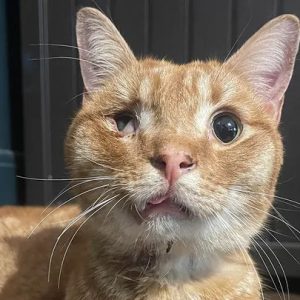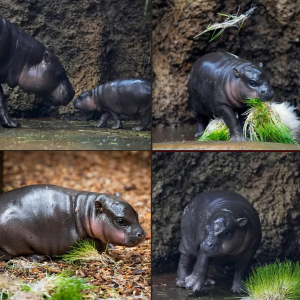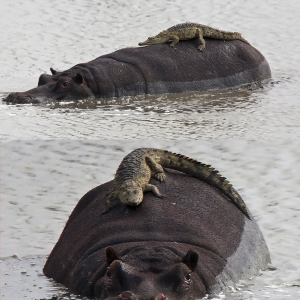
CLEVELAND, OHIO — Inside the space devoted to western lowland gorillas at Cleveland Metroparks Zoo are seven family troop members, including a female named Fredrika. She’s gently cradling a tiny infant while a toddler rides on her back, dismounting to play with a fresh pile of hay.
Fredrika, known to zoo staff as “Freddy,” turned 50 years old on June 5, which is 13 years past the average lifespan for a gorilla in captivity. She is a mother of 12, a grandmother, and a great-grandmother. She is also the primary caretaker of two young gorillas whose mothers rejected them at birth, Kayembe and Jameela.
What’s truly extraordinary is that Freddy is nursing them despite her advanced age and lack of biological relation, says Kristen Lukas, director of conservation and science at the zoo.
“Freddy picked up Jameela almost instantaneously, which is exactly what she did with Kayembe [when he was an infant], only this time Kayembe was on her back while she was picking up Jameela on her front.” (Learn how animal mothers remind us of our own.)
Freddy’s behavior is an inspiring example of the adaptability and plasticity of primates, says Rich Bergl, director of the North Carolina Zoo’s Department of Conservation, Education and Science.
She “shows us what animals are capable of, that they’re not just automatons that consume food and give birth and die,” says Bergl, a National Geographic Explorer who studies western lowland gorillas, a critically endangered subspecies of western gorilla, in the wild and in captivity.
“They’re very much individual beings, just like people are, and have the ability to adjust to unexpected changes.”
How is lactation possible?
Laura Klutts, the Cleveland zoo’s associate animal curator, first noticed that Kayembe was not only suckling, but also swallowing. White droplets on Freddy’s breast confirmed that she was producing milk: Kayembe’s frequent suckling had apparently stimulated the production of prolactin, a hormone responsible for lactation. Called induced lactation, this phenomenon also exists in people, particularly those who take hormones in an effort to lactate.
The primate team was concerned that the quality of Freddy’s milk might not be nourishing enough to provide sustenance, so they contacted Michael Power, who studies the composition of animal milk at the Smithsonian Institution in Washington, D.C. He agreed to analyze Freddy’s milk.

Freddy the Gorilla with baby and another young gorilla.
PHOTOGRAPH BY DAN VELOSKI
As it turned out, her milk checked all the boxes for both calories and nutrients.
“This was the first time, to our knowledge, we had seen a female of this age as a surrogate lactating,” says Lukas. (See beautiful moments between animal moms and their babies.)
Power attributes her induced lactation ability to her years of experience as a mother. “She’s had multiple babies and knows what to do. Just as an experienced athlete has muscle memory, her brain and body know how to switch back into parenting mode. Oxytocin is released to nurture bonding, then prolactin [to produce milk].”
He adds, “I think Freddy is a mom. I think that’s who she is.”
Craig Stanford, professor of biological sciences at the University of Southern California, notes that gorillas don’t experience a pronounced menopause the way humans do, which might explain Freddy’s ability to nurse at such a late age.
“While humans underwent this major evolutionary shift in experiencing menopause, none of our relatives really do. Great apes don’t live as long as humans, but their reproductive systems age at the same rate as the rest of their bodies.”
“It changes you”
Freddy’s role in her family group also highlights the significance of seniors.
“In some ways [her behavior] is a reflection of our society as a whole, reinforcing the value of older females in extended family units,” notes Lukas.
“What somebody like Freddy shows and teaches us is never to underestimate an older woman,” she says.
Indeed, wisdom is the word Lukas most readily uses to describe Freddy.
“With Koko [the signing gorilla] we came to know and appreciate gorillas on our terms. With Freddy we get to know and appreciate gorillas on their terms and have learned so much about gorilla behavior from her.”
For instance, the team has observed Freddy carrying babies on her back much earlier than other gorilla moms, allowing her to move freely while giving her young a secure place to build confidence.
“It’s our mission to not only make sure we’re taking excellent care of the animals here at the zoo, but also to connect their experiences to what’s happening right now in Africa,” says Lukas, who oversees the conservation of gorillas throughout AZA-accredited zoos in North America and in the wild. (See photos of gorillas in the wild.)
“We’re grateful to be able to tell some of these stories through gorillas like Freddy.”
Lukas adds that although zoo visitors often “focus on the babies because they are so adorable… I tell everyone to look at Freddy.
“Her eyes are some of the most beautifully expressive gorilla eyes I’ve ever seen, and I know a lot of gorillas. Anytime I get a chance, I look in her eyes. It changes you.”





